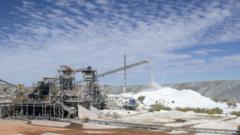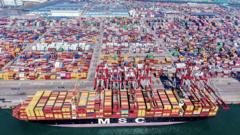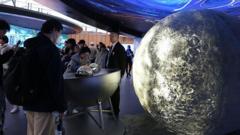In response to China's rare earth export restrictions, Australian Prime Minister Anthony Albanese aims to invest A$1.2bn in a strategic reserve for critical minerals, potentially altering the balance of power in technology manufacturing.**
Australia Eyes Rare Earth Dominance Amid China’s Export Restrictions**

Australia Eyes Rare Earth Dominance Amid China’s Export Restrictions**
As China imposes export limits on crucial rare earth elements, Australia plans a strategic reserve to secure its position in the global market.**
Australia is stepping into the rare earth minerals arena as geopolitical tensions escalate with China. Prime Minister Anthony Albanese announced his intentions to establish a strategic reserve worth A$1.2 billion (£580 million) if re-elected in next month's election, amid China's recent clampdown on exports of seven essential rare earth elements. These elements play a critical role in producing cutting-edge technologies, including electric vehicles and advanced military systems, underscoring their global significance.
The Chinese restrictions are viewed as a retaliatory measure against the U.S. tariffs during the Trump administration, which saw tariffs on Chinese imports soar to 145%. As a result, Western countries, particularly the United States, are increasingly concerned about their dependence on China for essential technologies. Between 2019 and 2022, about 75% of U.S. rare earth imports originated from China, revealing the scale of this reliance.
Albanese aims to shield Australia and its allies, like the U.S. and EU, from reliance on these crucial materials. His proposed reserve encompasses rare earths and other key minerals, positioning Australia as a pivotal player in the global supply chain. However, experts caution that despite these proactive measures, the refining bottleneck still predominantly lies in China, which currently handles 90% of the global rare earth refining process.
Recent sentiment from industry leaders like Tesla's CEO Elon Musk highlights the immediate impact of these export controls, as they hinder critical projects, including the development of humanoid robots. Yet, analysts suggest that while Australia's initiatives are commendable, they fall short in addressing the core issue — China’s monopolization of rare earth refining capabilities.
Efforts are underway in Australia to bolster its refining capacity. Arafura Rare Earths is working to establish the nation’s first integrated mine and refinery, while Lynas Rare Earths has opened a processing facility in Western Australia. However, experts project that Australia will remain reliant on Chinese refining capabilities until at least 2026.
In the shifting landscape of global trade, China has leveraged the volatility caused by U.S. policies to position itself strategically. China's ambassador to Australia has criticized U.S. trade policies in local media, urging collaboration with Australia — a plea that Albanese has resolutely rejected.
In pursuit of independence, analysts like Alicia García-Herrero argue that Albanese's strategy could allow Australia to influence global pricing by selling mineral reserves during economic tensions. Despite these aspirations, they warn that Australia is unlikely to outpace China in refining processes fully. As the world navigates these complexities, the balance of power in critical mineral supply chains continues to evolve.





















